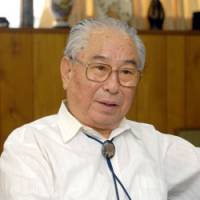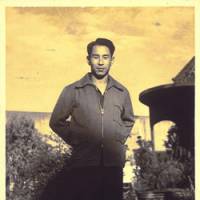Sixth in a series
Beyond the torment of World War II and his postwar incarceration on Java and at Tokyo's Sugamo Prison, one of Susumu Iida's earliest recollections of the war is meeting an Imperial Japanese Army general in fall 1942.
Gen. Iwane Matsui was a "frank man who looked like any other grandfather in the neighborhood," Iida recalled, although Matsui, then 64, had already commanded the Shanghai Expeditionary Forces in Nanjing.
Iida, merely 19 at the time, was being trained at an affiliate body of the Ministry of Greater East Asia to manage and oversee Japanese colonies in Asia.
The general nodded kindheartedly at Iida's idealistic opinions on Pan-Asianism and liberating the East from Western rule — notions that were soon crushed by the reality of the war Japan was waging.
Iida would witness the war's horror in the starving soldiers fighting on New Guinea. And Gen. Matsui would later be convicted by the International Military Tribunal for the Far East as a Class-A war criminal for masterminding the 1937 Nanjing Massacre. He was hanged in 1948.
"I think Gen. Matsui was an honorable man," Iida, now 84, said in a recent interview in which he criticized Japan's postwar government for not holding the late Emperor Hirohito (known posthumously as Emperor Showa) accountable.
"The lingering issue is that although it has been over six decades since the war ended, Japan has yet to determine who was responsible for the war and what caused it. Who was ultimately liable? This question remains unanswered," he said.
Iida, a Yamaguchi Prefecture native whose father worked in a coal mine, was sent by the Imperial navy to New Guinea in 1943 as a civilian employee to help maintain public order. His duty was to help oversee the area by using his knowledge of the local language.
He soon realized his noble passion to free Asia from its Western shackles was a naive delusion.
Poor planning and inadequate food supplies caused Japanese soldiers on New Guinea to starve to death, and malaria and other diseases spread as troops fought guerrillas in leech- and mosquito-infested jungles, Iida said.
"The headquarters didn't know what was happening on the island. We were all starving to death," he said. "Many people are unaware that those who died on New Guinea died not in vain against the enemy but in anger against inept commanders who planned botched attacks."
Iida was captured by Dutch forces in the western part of New Guinea after the end of the war and was tried there as a Class-B/C war criminal in 1948.
He was accused of carrying out summary executions of several innocent civilians — an accusation he said was based on fabricated information. He maintains he never went on the murderous rampage as alleged by the court.
"I killed only one man during the war. That was it. I used my sword and killed him with a single stroke. But he was a man suspected of attacking the Japanese army," Iida said.
He said no witnesses were allowed to testify on his behalf during the 30-minute trial. The court sentenced him to 20 years and he was sent to a prison on the island of Java.
Records show that some 4,400 Japanese soldiers and civilians were found guilty of Class-B/C war crimes, and 1,000 were hanged by the victors.
Iida said he challenged the legitimacy of his trial, but opted to accept his punishment because he believed one had to be held liable for the atrocities Japan committed.
"I accepted the ruling because of my conscience. I felt I had to apologize for the casualties of war," he said.
In 1950, Iida was transferred to Tokyo's Sugamo Prison. He was back home in Japan.
Compared with the cells on Java, the Sugamo facilities were "heavenlike," especially after the Korean War in the early 1950s, when many of the U.S. troops in Japan were redeployed to the peninsula. The San Francisco Peace Treaty signed in 1951 also transformed Sugamo into a less stringent environment, he said.
It was in Sugamo, where Class-A war criminals were hanged, that Iida's path crossed that of Gen. Matsui again.
"Inside the prison I found the execution chamber," he said. The scaffold for the gallows stood higher than 3 meters and had 13 steps to the top, Iida said, and the names Iwane Matsui and Gen. Hideki Tojo, the wartime prime minister, were scribbled on one of the beams.
"The two were hanged right at that location. Some American G.I. who executed them probably wrote their names."
Iida lingered at the gallows for a while and remembered his conversations with Matsui.
He was released from Sugamo in 1956, but life didn't get much easier.
He married after his release, but his son, born in 1960, suffered severe birth defects — side effects from the sedative thalidomide. The drug, sold in the late 1950s around the world mainly for pregnant women to help ease morning sickness, had induced deformity in thousands of babies worldwide.
Iida went on to organize the first successful lawsuit against the government over a drug-induced disaster, getting the courts to agree the government failed to withdraw the drug at an early stage despite being aware of its harmful side effects.
He founded a rehabilitation center for disabled children in Kanagawa Prefecture in 1968 and remains the director of the facility to this day.
Thalidomide-related activities have kept Iida busy over the years, but his experiences in the war have continued to haunt him. He believes Japan has not atoned for its sins.
Although the postwar tribunal sentenced Tojo and six other Class-A war criminals to hang, Emperor Showa was never held to account for the war.
"Japan is an ambiguous country in terms of war responsibility," Iida said, questioning the government's decision not to hold Emperor Showa liable.
The diminishing sense of honor and ethics in today's Japan and the fact that Bushido has ceased to be a virtue are rooted in this decision, he said.
Iida has published several books about his war experience to pass on his message to younger generations.
"It has been revealed that Gen. Matsui was not in direct command of the massacre in Nanjing when the atrocities took place, but despite that, he chose to take responsibility out of conscience. That is why he was hanged," Iida said.
He continues to wonder who should be ultimately held liable for the war and who issued the orders that led so many soldiers to starve in New Guinea's jungles. Iida also agonizes over having had to spend so many years behind bars as a war criminal after a questionable trial, and why Matsui, a general whom he believes embodied the honor of Bushido, had to die.
"As a Japanese, I wouldn't have wanted (to see Emperor Showa) tried in a court," Iida said. "But whether he was truly innocent or not is a different story, in my opinion."


















With your current subscription plan you can comment on stories. However, before writing your first comment, please create a display name in the Profile section of your subscriber account page.